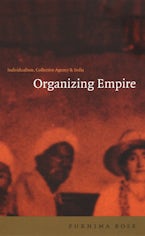“Organizing Empire is an excellent discussion of colonial subjectivities and, in particular, how concepts of individualism and collectivity form a binary that is used by both colonial power structures and anticolonial formations.”-Inderpal Grewal, author of Home and Harem: Nation, Gender, Empire and the Cultures of Travel
“Organizing Empire makes an important contribution to postcolonial theory. Through her theorization of individualism, Purnima Bose opens up in compelling ways the counterpossibilities of collective agency and helps move the discussion of anticolonial resistance from a generalized ‘subject’ to the analysis of specific conjunctures of resistant practice.”-David Lloyd, author, Ireland after History
"Organizing Empire . . . serves to reveal the ideas of postcolonialism and to provide a bridge . . . over the immense divide that has developed between so much of contemporary literary studies and the discipline of history."
- Terry Crowley (Canadian Journal of History) "A dense, thoughtful book about individualism and group identity in the colonial era and in the formation of Indian nationalism."
(Foreign Affairs) "Bose's multi-sited research lays rich new grounds for complicating issues of documentation and representation as she questions the means by which various agents of struggle can or cannot be recognized within elite-imperial narratives. Bose's Organizing Empire undoubtedly enriches potential sites for postcolonial work, while reconfiguring the geopolitical and historical scopes of subaltern studies."
- Lucienne Loh (Interventions) "One of the most noteworthy achievements . . . of the book . . . is the attention that it devotes to the traffic between the different colonies of the British empire, especially Ireland and India. . . . Bose's analysis . . . is assured and persuasive. . . . A sober and useful contribution to studies of empire."
- Parama Roy (American Historical Review)

